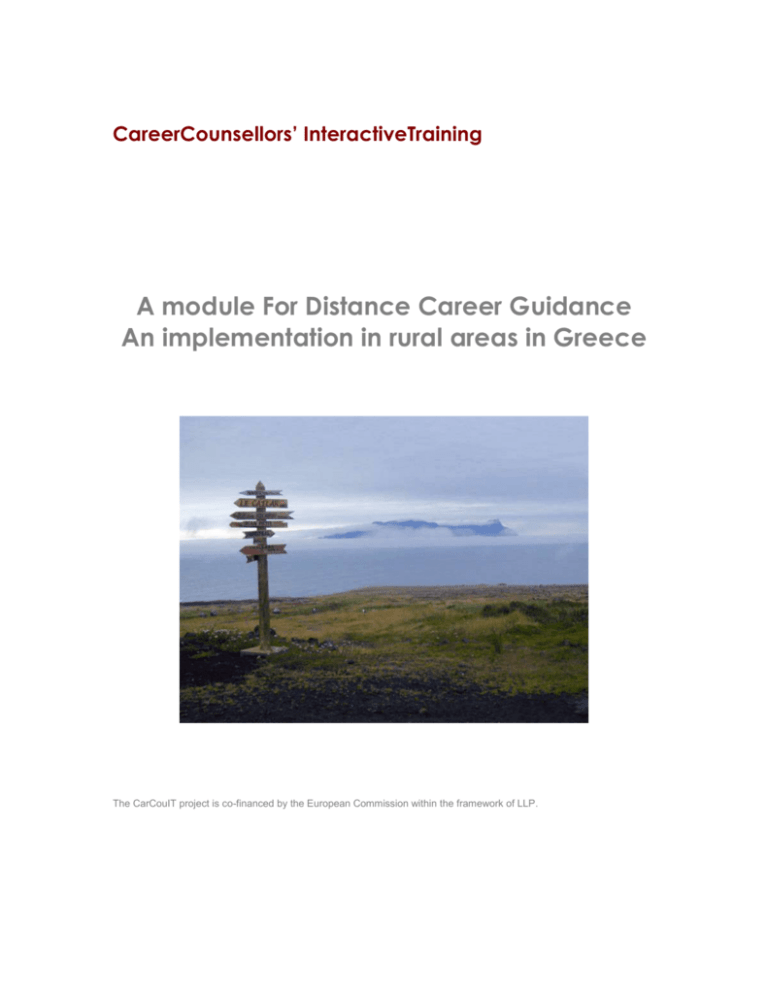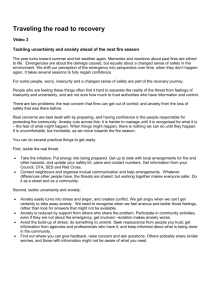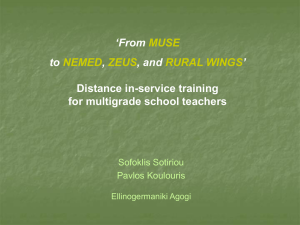career guide for schools_telesimvouleutiki
advertisement

CareerCounsellors’ InteractiveTraining A module For Distance Career Guidance An implementation in rural areas in Greece The CarCouIT project is co-financed by the European Commission within the framework of LLP. CareerCounsellors’ InteractiveTraining 134005-LLP-1-2007-1-GR-COMENIUS-CMP A module For Distance Career Guidance An implementation in rural areas in Greece Editor: Nora Gikopoulou The CarCouIT project is co-financed by the European Commission within the framework of LLP. Career Counsellors Interactive training: A different Approach Introduction Do you remember a sweet fairy tail from your childhood, “Alice in Wonderland” from Lewis Caroll? As Alice is walking around, she gets lost, she gets confused and she had no idea where to go. She was standing in the middle of crossroads and she didn’t’ know which direction to choose. Then a cat came up, looked at her and told her: “North, east, south or west which direction is the best if the choosing gets confusing maybe it’s the map you are using” Necessity of Career Guidance The ‘new era’ of information and knowledge which is characterized by unexpected and rapid changes in technology and in the labor market often shocks individuals who feel lost and vulnerable in the midst of the flux created around them causing insecurity and anxiety. McLuhan (1964) has already suggested that we live in ‘an anxiety era’, whereas Giddens (1994) uses the term ‘manufactured uncertainty’, which has been developed in the last four decades and needs to be analyzed in the context of globalization. In this context, that is, in the process of connecting the local with the global, through the new methods and channels of communication, new forms of uncertainty and risk are emerging and anxiety is intensified. According to Habermas (1987), the extension of interaction in the time-space context may lead to further anxiety which creates a sense of loss. Rapid changes in multiple contexts (educational, socio-economic, cultural) often invalidate predictions and ‘investments’ one makes for one’s future and cause disappointment, insecurity and anxiety about the uncertainty which seems to be a dominant characteristic of today’s world. Giddens (ibid) supports the argument that globalisation creates new forms of uncertainty and new kinds of social stratification. The sense of uncertainty can be even more intense for young people who try to build their future and have to deal with an unknown world of work, full of changes and various educational and occupational dilemmas. The demands of the labour market have multiplied in terms of skills (especially technological), experience, flexibility and mobility. Getting a job is a basic step towards becoming fully integrated in society. But today’s young people are concerned not only with avoiding unemployment, but also with finding a job that offers some satisfaction. They realize that employment is a key factor of social cohesion and the basis for financing social and intergenerational solidarity. The transition between school and work is filled with obstacles and young people are becoming more depended economically. The area which significantly influences and will more and more influence the harmony between education and labour market is the area of career education and counseling. There is no part of life where the need for guidance is more empathic than in transition from school to work--the choice of a vocation, adequate preparation for it, and the attainment of efficiency and success. At present, we may state insufficient transformation of career counseling to new socio-economic conditions, to crucial changes in the world of work. The career guidance in education sector has a principal significance not only for the choice of educational career of pupils and students but also for the transition of school-leavers to the world of work. It increases the probability of their success, interest in further education and will of retraining, that means, the preparedness for change of employment. Studies of guidance and counseling programs, reports by the business community, and feedback from parents have raised concerns that many young people do not have the necessary knowledge, skills, and attitudes to make a successful transition from school to the world of work. Career planning is not instinctive. The educational system must provide to students information and taught basic knowledge, skills and attitudes to facilitate a smooth journey from adolescence to adulthood. Life career development is self-development over the life span. It occurs through the integration of the roles, settings and events in a person's life. The word “life” in life career means that the focus is on the total person -- the human career. The word “career” identifies and relates the roles in which individuals are involved (worker, learner, family member, citizen), the settings where individuals find themselves (home, school, community, workplace), and the events that occur over their lifetimes (entry job, parenthood, job change, retirement). Finally, the word development is used to indicate that individuals are always in the process of becoming. According to the concept of life career development, it is practically unthinkable to prepare young people for their life of work without occupational exploration. This is accomplished through the student's school subjects and extra curricular activities with the help of parents, teachers, friends and representatives of the world of work and the community. This way of proceeding not only allows the students to explore who they are but to explore their surroundings. Thus, the students can be exposed to a whole range of occupational opportunities, establish a relation between their personal characteristics and those of occupations, and acquire more information about the knowledge, skills and values required in the world of work. The life career development of young people should be a process of planned intervention whereby educators, parents, government agencies and community members work together to provide students with hope for the future and to empower them to believe in themselves. Young people need help to keep their eyes open for opportunities in the world that will allow them to fulfill their values, beliefs and interests and to reach their fullest potential. Reviewing all the above mentioned facts one could conclude that it is absolutely necessary for actors implicated in the educational system to empower students to acquire the knowledge, skills, information, and attitudes to understand and positively enhance their own life career development. Young people must be prepared to cope with the changing trends of our days, by having the capacity to be resourceful, adaptable and flexible amidst change and ambiguity. It is in this context of constant change that adolescents must make decisions regarding their life careers. Cooperative efforts of the school, home and community are needed to help young people successfully make the transition from school to the world of work. Career Counselling From Distance The distance career guidance session is the outcome of a synergy of four European projects, Career Guide for schools network, which concerns the collection of exercises and activities of career guidance, implemented in students, the carcouit project, which refers to career counsellors training and Rural Wings and Hermes projects, which provide broadband internet in rural areas through Europe. As a product, the teleconference tool provides broadband internet in rural areas, a chat room and the possibility of a videoconference and power point presentations. As a counselor I have used this tool many times for distance career guidance lessons. We deem that is an excellent opportunity to help effectively students who live in those areas. We have noted that these students, have limited intensives in comparison with students living in town, limited information and limited perspectives. Students are planning their future, especially the professional future, according to the beaten track. They believe they do not have opportunities or alternative choices. Via teleconference tool offered at the one hand, access to information, like educational system, departments of universities, jobs’ descriptions etc…and at the other hand a full distance career guide session. The conference tool and the career guidance process address to people who live in disantavantaged rural areas and especially to students from 12 to 19 years old, to teachers and counsellors who provide career guidance and of course to unemployed people who are trying to find a job. At the conference presented a distance career guidance session in a small island in Grteece, Leipsoi. Trying to evaluate the outcome of the session, we measured 5 parameters, before and after the session. 100 90 80 70 60 50 40 30 20 10 0 enjoy before after anxiety So, according to the questionnaires, before the session, just a 50% of students were believing that will enjoy the distance session, but after that, almost everybody enjoyed that. Before the lesson only 36% believed that will learn something more for self concept, but after the lesson, 96% of the students had learn an unknown aspect. About 82% were expected to be frustrated but after the session only one kid felt frustration. 65% of students believed that will be motivated and after the session 94% found new motivations for boosting their self esteem Finally, most of the students felt anxious before the lesson, as it was an unknown process for them but only one student was feeling anxious after the lesson. According to the students’ point of view, the distance session was a fruitful and revealing process. “It was funny and motivated” “At the beginning, we felt uncomfortable but…then we enjoyed it!!” “It was a different approach…we were focused…we didn’t get bored” “Actually it was a lesson…but not a lesson exactly” Students’ comments At this moment there are 25 installations in rural areas through Europe and 14 more in Greece. The cost of the conference tool is 1750 € for each terminal and 300 € per month for satellite broadband connection. Apart from the one day training for the users, there are no other costs. It is offered by pay, by satellite providers. Epilogue Year by year, students, parents, teachers and counselors realize more and more that career guidance is not a luxury but a necessity. A life plan seems like a cornerstone in the professional and personal life of individuals. Personal Development, information management, awareness, setting goals, decision making, decision implementation, career change, are some of the main steps of career counseling. Concluding in two words, we can say that the two “magic” words are adoptability and flexibility in new circumstances. Some photos







